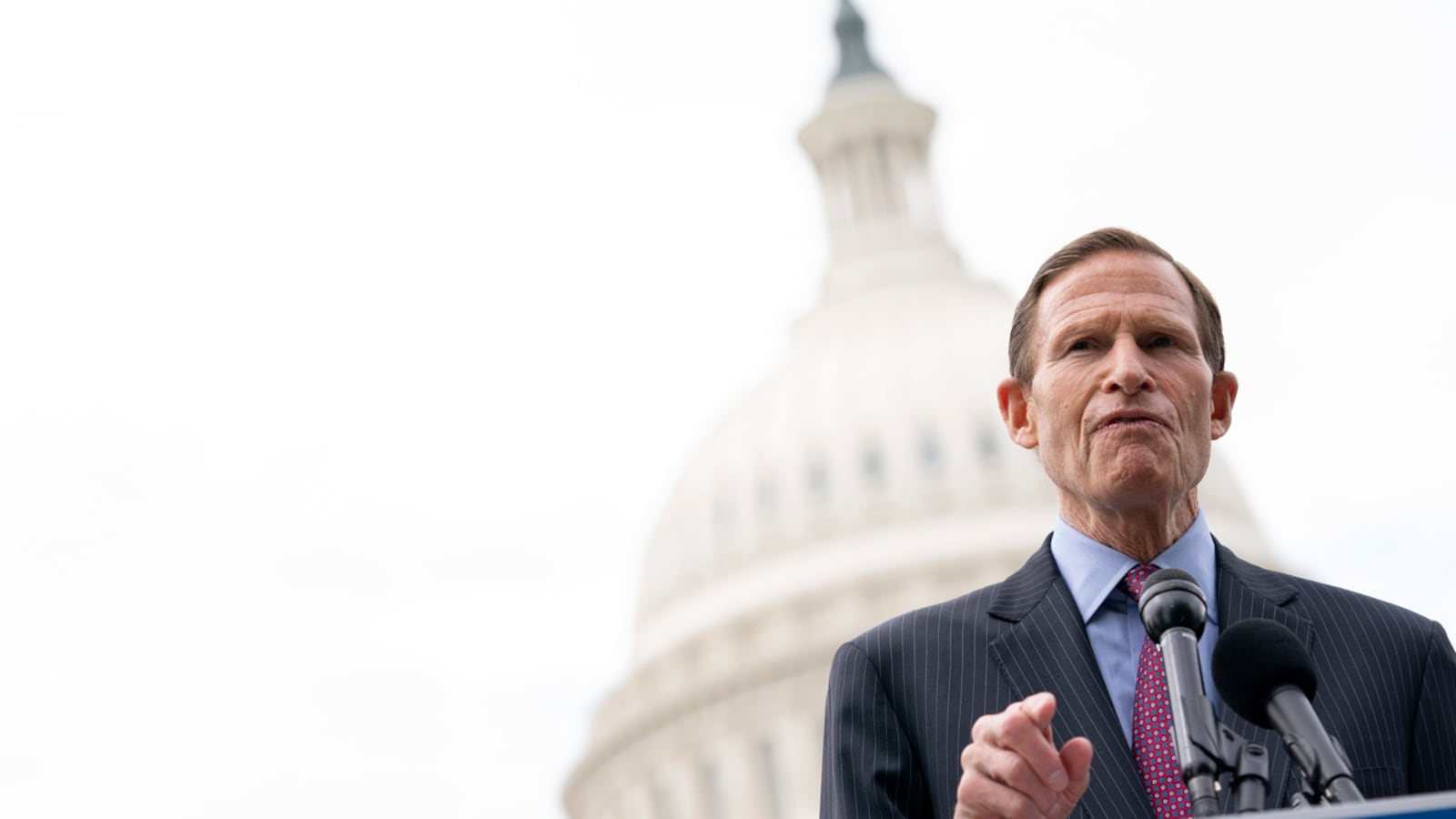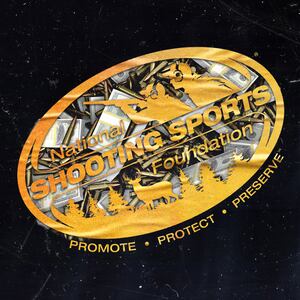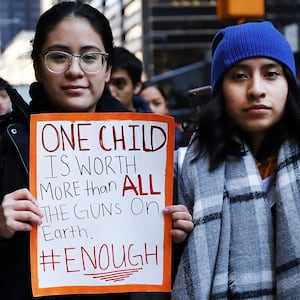Sen. Richard Blumenthal (D-CT) is taking aim at a gun industry association for the way it engaged in a tax-dodging “voter education” scheme that also violated a core tenet of Second Amendment enthusiasts: compiling a detailed database of gun buyers.
The Daily Beast has obtained a letter, which Blumenthal sent to the National Shooting Sports Foundation on Friday, calling out the association for allegedly amassing a list of gun owners and what types of guns they own—all to further its voter influence campaigns.
NSSF is made up of the nation’s largest gun makers and once had a running political campaign deal with Cambridge Analytica, the now-defunct British data analytics company caught meddling in the 2016 U.S. election.
Blumenthal’s letter cites damning details that were exposed when Cambridge Analytica emails were leaked two years ago but received little attention at the time.
“The claim by Cambridge Analytica that NSSF maintains and leverages a database, akin to a registry, of gun owners’ personal information should come as a surprise to millions of law abiding gun owners, many of whom, undoubtedly, would never have consented for firearms manufacturers or retailers to retain, share, and expose their sensitive personal data for political purposes,” Blumenthal wrote.
His letter was addressed to NSSF President Joseph Bartozzi. The industry group did not respond to questions about it sent by The Daily Beast on Friday.
Blumenthal, who has a long track record of attacking federal agencies and large corporations for violating Americans’ privacy rights, told the group that “Congress deserves a full explanation” and cited “the implications on firearms regulation as well as consumer privacy protections and data security risks.”
As evidence, the senator pointed to a batch of Cambridge Analytica emails that laid out its business relationship with NSSF at the time. But it also provides a window into alleged questionable activity by the firearms group, which is a nonprofit and has limits on how it can engage in lobbying activity.
According to IRS rules, a nonprofit that spends significant funds on political influence campaigns must later contact its donors and pass along an accounting headache: instructing them to reduce the tax deduction from their individual donation. It’s called a “proxy tax.”
In one Feb. 2016 email, Cambridge Analytica strategist Matt Oczkowski described how the gun manufacturer association engages in political campaigning and dodges this kind of tax, reaching just the right voters by tapping a massive consumer database accrued by a long-time gun industry lobbyist.
"NSSF is a trade organization made up of all the gun manufacturers selling in the US. Each year, they run a large campaign aimed at 'voter education'. They call it voter education to avoid the corporate proxy tax by directly endorsing any candidates and focusing on the issues,” Oczkowski wrote to his staff.
“Pat O'Malley, our contact with access to the money, has been running this campaign for them since 2002 and it has been almost entirely direct mail. Pat was leveraging a database of firearms manufacturing warranty cards (collected by the firearms companies) to determine his targeting in key states (millions of people, if they bought a gun, and what kind of gun they bought),” he continued.
The analyst goes on to explain what Cambridge Analytica—which was co-founded by rightwing Steve Bannon and assisted the Trump campaign at the time—would do with the new information.
“We would match this data to our database, model it, enhance it with our gun data, and determine groups of persuadable voters who support gun rights and also turn them out to vote. The flight of the campaign would be from April-November,” Oczkowski wrote.
Oczkowski, who went on to lead the analytics firm HUMN Behavior and advised the Trump 2020 campaign, did not respond to a request for comment.
For decades, gun rights absolutists have warned that amassing a database would pose an existential threat to American liberty, essentially giving an authoritarian government a list of who to target first during a dictatorial crackdown. It’s why four separate legal provisions prohibit a national registry of firearms, according to a recent report by the Congressional Research Service.
The gun industry’s favorite Bogeyman is ATF—the Bureau of Alcohol, Tobacco, Firearms and Explosives—and for decades since 1979 Congress has blocked that agency from using any funding whatsoever to pay for the “consolidating or centralizing” of any purchasing records from gun shops.
Meanwhile, the FBI, which conducts background checks for every gun purchased from a licensed dealer, by law cannot “establish any system for the registration of firearms, firearm owners, or firearm transactions”—instead only keeping details on the people who tried to buy one but failed the background check.
But the fear doesn’t stop at government surveillance. Just last month, the NSSF’s own senior vice president for government and public affairs explained why it would be horrifying for even a private entity to maintain such a list.
Larry Keane, who is also NSSF’s top in-house lawyer, appeared on The Reload podcast on Sept. 19 to discuss congressional bills proposed by Democrats that would give the feds a closer look at gun purchases—and possibly pressure banks to identify exactly what firearms, ammunition, and related gear end up on the receipt.
Keane, speaking to independent firearms journalist Stephen Gutowski, described the measure as “just fraught with opportunities for abuse.”
"You have an invasion of privacy," he said, going on to detail how the existence of any database—in anyone’s hands—could be seized by government agents.
"It's given to law enforcement or ATF and then all of a sudden law enforcement shows up at your door and says let's see what you purchased... you have privacy issues wrapped around the exercise of a fundamental constitutional right. It's very, very troubling," he said. "They want to see what you're buying so they can stop you from buying it."
On Friday, The Daily Beast asked NSSF how its deal with Cambridge Analytica and its apparent accumulation of consumer purchases doesn’t violate its long-held stance that such a database would be an invasion of privacy. The organization did not respond before this story published.
However, on his podcast appearance, Keane stressed that there are no exceptions.
"You could have a registry of gun owners maintained by private corporations, which is concerning the same way a government database would be concerning," Keane said.
The NSSF has not received even a fraction of the scrutiny or hostility that anti-gun groups have directed at the National Rifle Association, which claims to represent individual gun owners but is deeply deferential to the industry. However, NSSF briefly received pressure following the murder of 20 first graders and six adults by a mass shooter at Sandy Hook Elementary School, because the industry group is based in the same town: Newtown, Connecticut.
Everytown for Gun Safety, a group that advocates for stricter firearms laws, lambasted NSSF for what it called “shameless hypocrisy.”
“The gun industry has spent decades fear-mongering about so-called registries of gun owners but it turns out all along the call was coming from inside the house,” said Nick Suplina, the group’s senior vice president of law and policy. “This type of shameless hypocrisy from NSSF is exactly what we’ve come to expect from an industry that is hell-bent on profit over everything else.”
Gunmakers have historically been terrible at keeping track of their own customers, according to former gun industry executive Ryan Busse, who wrote a tell-all book titled “Gunfight: My Battle Against the Industry That Radicalized America.” Manufacturers are kept out of the loop, because guns get sold from factories to wholesalers, who then place them at federally licensed dealers.
Busse told The Daily Beast that gun companies have only recently begun to get some visibility into their customers and their purchases through an alternate route: selling them model-specific accessories directly to individual customers online. He said this list would be a gold mine—one that stands diametrically opposed to a long-standing principle in American gun culture.
“It’s been a source of measurable frustration that they don’t know who their consumers are. If the NSSF has this list… that’s the height of irony,” he said.










